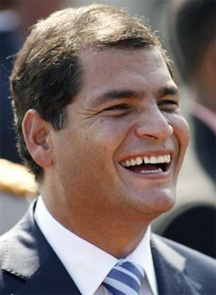QUITO, (Reuters) – Three members of Ecuador’s governing coalition in Congress have withdrawn their support for President Rafael Correa over his plan to hold a voter referendum he says is aimed at reforming the justice system.
The defections, along with the resignation of two minor cabinet ministers over the plebiscite, will make it more difficult for leftist Correa to gather the 63 votes needed to push his agenda through the 124-member legislature
.
Correa proposed a set of constitutional changes this month that he said would improve the way judges are chosen, but which critics argued were really aimed at tightening his grip on the country’s institutions.
“In the exercise of power, we must be willing to recognize limits,” Congresswoman Maria Paula Romo said on Friday, announcing her resignation from the coalition. Two other members quit the block earlier in the week.

The defections came as Correa tried to garner congressional support for politically sensitive bills such as one that would regulate water supplies situated near mining operations and another aimed at regulating the media.
Correa is considered part of a South American alliance that includes fellow leftists Hugo Chavez of Venezuela and Evo Morales of Bolivia, who have also sought to change their countries’ constitutions to increase executive powers.
Lawmakers from Correa’s Country Alliance party, which remains loyal to the government, issued a statement saying they strongly backed the referendum as a way to “deepen the principles of the citizens’ revolution.”
Correa was first elected in late 2006 under the “citizens’ revolution” banner, promising to increase state control over the country’s key oil sector and to fight what he calls the country’s corrupt elite and traditional political parties.
Petty crime is on the rise in OPEC-member Ecuador, where people complain bitterly about corruption among judges. The situation, compounded by a sluggish economy, could grow to threaten Correa’s popularity.
He wants judges to be chosen by a committee made up of an independent oversight group and members appointed by the executive branch and the Congress. Currently, judges are named by an independent committee of jurists.
Some observers worried that the proposed system would allow Correa to name whomever he wanted to the bench.




